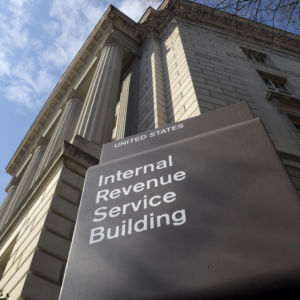The House Ways and Means Committee heard from a panel of experts Wednesday about problems taxpayers are having when dealing with the Internal Revenue Service (IRS).
The IRS tends not to be all that liked as a federal agency anyways – but that view has become increasingly bad in recent years when it comes to the services the agency provides. Expert witnesses who have worked with taxpayers expressed concern during the hearing that the agency isn’t providing adequate services and help.
Congressional Republicans are also advancing legislation aimed at overhauling the tax code. They have promised to make taxes easier to file by simplifying the process – but critics have countered that the reforms would actually make the tax code more complex by creating new loopholes.
Jennifer MacMillan, the government relations chairwoman at the National Association of Enrolled Agents, warns that the services that agency provides are being viewed less favorably by taxpayers. She points to what she has heard while working with Enrolled Agents (EA) – licensed tax practitioners who represent taxpayers.
“The IRS, for better or worse, is the face of the federal government for most citizens,” MacMillan said during the hearing. “Increasingly, EAs that assists taxpayers at all levels of administrative dealings with the IRS believe that taxpayer services in recent years have deteriorated to an unacceptable level.”
MacMillan notes every option taxpayers have to connect with the agency is limited – whether that is an in-person help center, telephone, or online self-help services. She warns this makes it more difficult for taxpayers to get help or answer questions. She notes lawmakers should bolster personnel and resources to better assist taxpayers.
“Congress should consider the following policy and legislative changes,” MacMillan said. “Provide the IRS with additional targeted resources that are detailed in our written testimony, create and fund dedicated training, increase the authority and set higher standards for appeals personnel.”
MacMillan adds lawmakers should also increase the authority and training of collections personnel and reevaluate national standards for collection information statements. She says that those reforms will help improve access so taxpayers can get help while also improving services generally.
Phillip C. Cook Low Income Tax Clinic associate director Tameka Lester echoed similar concerns with a focus on how low-income taxpayers are in particular need of help. She says those taxpayers have access to services to help them do their taxes like Low Income Taxpayer Clinics (LITC) and the Volunteer Income Tax Assistance (VITA) program – but often find themselves without a lot of help when dealing with other issues.
“The VITA Program provides no-cost tax representation services and refundable credits like the Earned Income Tax Credit make a tremendous difference for them in bridging the poverty gap,” Lester said during the hearing. “But what happens when the IRS has questions about their return or determines the taxpayer got a refund that they’re not entitled to? When it’s time to work with the IRS, what are their options for communicating with the service?”
Lester adds that the low-income taxpayers she works with have a desire to resolve their issues properly – but are often limited in how they can. They generally have few options for connecting with the agency since some don’t even have internet access or a phone. The help centers are useful but they have limited locations and personnel.
“They need our help in order to do that,” Lester said. “By improving online technology, providing more representatives for taxpayers to speak with over the phone and in person, and increasing the statutory cap for organizations who are operating LITCs, the service can increase accessibility of their agency and enhance the overall experience for all taxpayers.”

